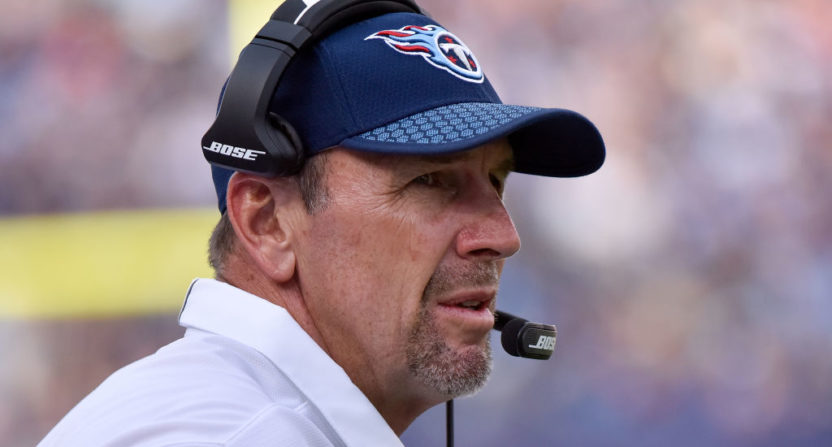Tennessee Titans head coach Mike Mularkey still hasn’t gotten over a specific play that took place in their 40-17 loss to the Pittsburgh Steelers. At the end of the first half, Antonio Brown fumbled the ball and Martavis Bryant recovered the ball ten yards downfield and that led to a Steelers field goal.
The play should have been marked back at the original fumble if the Steelers recovered because it’s illegal for someone to recover their teammates fumble in the final two minutes in half or overtime and on fourth down. The motivation to have this rule was because of the infamous “Holy Roller” play by the Raiders in the 70’s.
Needing a touchdown to win and almost going down for a sack, Ken Stabler moved the ball on the ground that looked like a fumble. The ball then squished up the field to Dave Casper who got to the ball in the end zone and got the touchdown.
Back to the Titans/Steelers game, it was clear it was a missed call by refs and Mularkey questioned why players and coaches have to publicly answer to making mistakes and referees don’t.
“You just want to see people held accountable as coaches and players are every Sunday,” Mularkey said, via Paul Kuharsky of paulkuharsky.com. “What happened after the fact? I know they’re graded just like we are. You want to know what happens when you make a mistake like that? That could have been the difference in the game, a field goal at the time.”
“I just want everybody held accountable.”
Mularkey points out that referees are graded and if they have a bad game and make mistakes, that hurts their chances of doing playoff games. But other than that, that’s all we seem to hear when a referee makes a bad call. Sometimes a pool reporter asks a few general questions to a ref but it’s not like a ref is available to the media. And then if a player or coach even remotely complains about a bad call, they get fined.
That’s something I have never really understood. One of the best things you can do in PR is to get in front of a story and even if it’s for a mistake or something else that’s bad, it’s the best move. That doesn’t necessarily happen too often but that’s the best way to go.
By not allowing a referee to explain why they made a call or to take responsibility for a mistake really just makes things worse. Maybe it’s unrealistic to open up a referee to the media and receive a barrage of questions for a bad call. People complain when the referee becomes the main focus of the game and that just magnifies that. Also, I’m sure if a referee made a mistake, nothing they say right after the game will satisfy them so it’s unnecessary.
On the other hand, referees in most sports have too much autonomy in the decisions they make. Much outrage could be simply a misunderstanding. What we think is a bad call and a mistake may be different because we saw it from a different angle and not where the referee originally saw it. Maybe we have a different interpretation of a rule (like holding or pass interference) that we think it’s a bad call and a ref thought they made the right call and in all actuality, both be correct.
Obviously, not everyone is going to be satisfied but it couldn’t hurt to have the referee explain their side of the story rather than everyone just assuming they didn’t know what they were thinking.
[ProFootball Talk/Paul Kuharsky]







